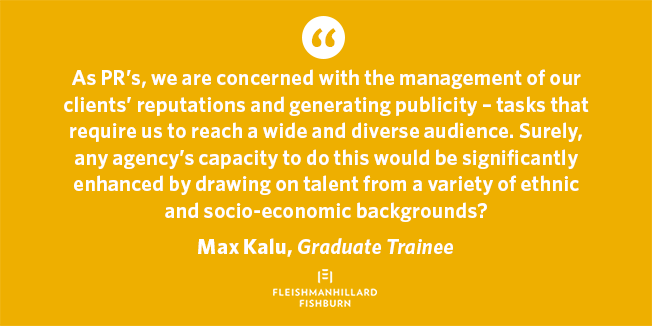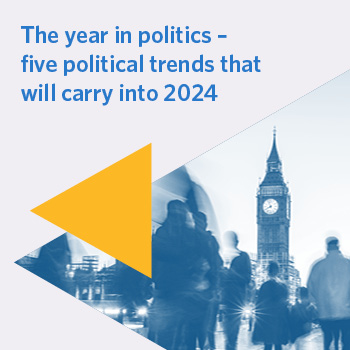Our Graduate Trainee Max discusses a big topic for the UK PR industry – the lack of diversity.

Growing up, I was privileged to have parents who instilled a strong sense of confidence and work ethic in me. Both Nigerian immigrants, they often reminded me that they “didn’t travel all this way, leaving friends and family behind, for our children not to be successful”. Because of this – and despite growing up on a “notorious” North London council estate, I have never felt anything but optimistic about my future.
But not everyone can say this. I have personally seen talented young people from diverse backgrounds become disheartened and, in some cases, totally discouraged from applying for roles in certain industries. Because they look different to most people in those industries, or come from different backgrounds, these people begin to believe that such careers “are not for people like me”. Why are we allowing these people to slip through the net?
As a graduate seeking roles in the PR sector, I regularly encountered buzzwords like ‘atmosphere’ and ‘culture’. In trying to capture wide-eyed university leavers, agencies know that a positive, inclusive workplace experience is crucial to attracting and retaining employees. And, having spent just over six months at Fishburn (now FleishmanHillard Fishburn, following our recent merger at the start of the year), I can honestly say the agency definitely delivers in this respect.
From the outset, I have been encouraged to contribute and constantly reassured that my colleagues are happy to advise me through any issues or challenges I may face. In an oversubscribed and competitive job market, I truly have landed on my feet, finding myself working with and being mentored by some of the best and brightest in Public Relations.
Despite the warm, welcoming culture we have at FHF, one issue remains that is in common with many other agencies in the sector – a distinct and obvious lack of diversity.
Only 8% of PR practitioners, according to the Public Relations Consultants Association (PRCA), come from ethnic minority backgrounds – this despite minorities making up 14% of the general population. In his campaign to make paid internships the norm, my colleague Ben Lyons – through his organisation Intern Aware – has repeatedly emphasised that companies place themselves at a disadvantage by limiting their intern recruitment efforts to the section of society that can afford to take unpaid roles. The same goes for diversity.
As PR’s, we are concerned with the management of our clients’ reputations and generating publicity – tasks that require us to reach a wide and diverse audience. Surely, any agency’s capacity to do this would be significantly enhanced by drawing on talent from a variety of ethnic and socio-economic backgrounds?
I became personally aware of the issue when first applying to this job. Submitting my CV online, I scrolled through the employees’ bios and noticed an obvious absence of people from BAME backgrounds. There was, admittedly, one Asian consultant, who took a very prominent position throughout the recruitment material. The cynic in me could not help but wonder if the agency were deliberately overcompensating.
My experience at FHF however, has made me hopeful about the industry. The final stage of the graduate application process brought together 12 finalists and, anticipating the normal imbalance, I walked into the boardroom expecting to be the only BAME representative in the group. I was pleasantly surprised, then, to see a very mixed room, with five other finalists being from diverse backgrounds.
Even though I knew I looked distinctly different from most people in the PR industry, I was never put off by this – and these five clearly weren’t either. But, too many still are, and all firms would benefit from taking a frank look at their workforces and drawing up plans to address their lack of diversity and break from the industry standard.
I have been given a fair chance at proving myself and have always felt like I’ve been welcomed with open arms. Now I want more of those talented young people from diverse backgrounds to feel the same way.
Find Out More
-
Platinum CMS Award
March 13, 2024
-
Changing Communications Tack at Mobile World Congress
February 21, 2024


